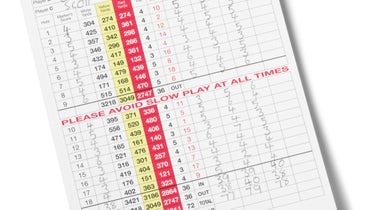
In golf, a Handicap Index is not a measure of a player’s average score. Here’s what it really means and how often you should match it.
Getty Images
Welcome to Stuff Golfers Should Know, a GOLF.com series in which we reveal all kinds of useful golf (and life!) wisdom that is sure to make you the smartest, savviest and most prepared player in your foursome.
Golf is a numbers game, with stats galore. But not all of those figures are created equal. Some are easier to interpret than others. Take par, for instance. That’s pretty simple. Or driving distance. Not much mystery there.
Handicap Index is a different story. Odds are you’re familiar with the term, but do you have a handle on what it means? More specifically, do you know how often you’re expected to match it?
Contrary to widespread misperception, a Handicap Index is not what you are expected to shoot in any given round. It is not a measure of your average score. It is, instead, a numerical value that represents your demonstrated ability. It’s what you’re capable of shooting, not what you can count on shooting your next time out.
Just as not all stats are equally simple to interpret, not all courses are as easy to conquer. The Handicap Index takes that into account by looking at your score in relation to the slope and course rating of the course you’re taking on.
Or, as Lee Rainwater, director of handicap education and outreach for the USGA, puts it: “We focus on the score in relation to the course to drive the Handicap Index.”
But back to the initial question. How often should you match your handicap?
In any given round, Rainwater says, it is expected that “you’re going to shoot two, four, five strokes higher than your Handicap Index.” You might shoot even higher if you have a poor day. Golfers vary in consistency. Some match their index more often than others. Generally, though, Rainwater says, you can expect to play to your handicap one in every four to five rounds. By our calculations, that gives you a 20- to 25-percent chance of living up to your abilities on the course.
Sign up to get your own handicap now
You can register for your own Handicap Index here. By doing up, you also get a membership to your local Allied Golf Association, which comes with a range of benefits, including the ability to play in handicapped events.









